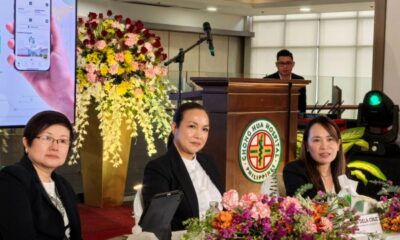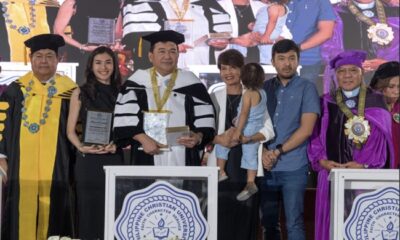Cebuanos Favor Move to Revive ROTC in Schools
Instructors of Reserve Officer Training Corps (ROTC) units in Cebu on Thursday belied claims of critics of President Rodrigo Duterte that the effort to revive mandatory service training of senior high school students will militarize the schools.
They also said that it will not violate domestic laws and international agreements protecting minors from being involved in warfare.
Dr. Antonio Esmero, a professor of the University of San Jose-Recoletos, told the Philippine News Agency in an interview Thursday that the current program of instructions (POI) for ROTC students in different schools is an evidence that ROTC is not meant to train the students to become warfighters.
“The critics are wrong. The trend of ROTC training now is to prepare our youth to be ready in case of calamity. They can see it in our POI that we are focusing more on disaster preparedness,” Esmero said. “Graduates of ROTC today are not going to war.”
Esmero, who also serves as the assistant commandant of the USJ-R ROTC unit, mentioned several occasions when the ROTC cadets were utilized in several civic activities.
“If only those who are against the ROTC program could see our cadets how the help in calamities, they will support it. For example during the September landslide in Tinaan, Naga City, ROTC cadets who were undergoing classes were pulled out to assist in repacking the relief goods for the landslide victims. All of the cadets happily reported to the Visayas Disaster Response Center of the DSWD (Department of Social Welfare and Development-7) for the repacking operations,” Esmero said.
The professor said there is nothing wrong if the state wants to prepare the youth for future emergencies. He said emergencies do not only mean war, invasion, or rebellion, saying natural or man-made calamities are also emergency situations that “we need to be prepared for”.
“To say that mandatory ROTC will militarize the schools is off-tangent,” he said. “They should look at the bright side of the program, not just criticizing it.”
Businessman Rudel Jugalbot, a graduate of advance ROTC, told PNA in a separate interview that several schools in Cebu that invited him to be their NSTP graduation speaker asked him the process of making ROTC trainings in their educational institutions mandatory.
“I have to tell them that under the existing law, ROTC is just but one component of the NSTP (National Service Training Program) law. Under this law, we cannot force the college students to take up ROTC,” Jugalbot said. “It goes to show that many people are interested to make it mandatory.”
He said school directors had told him if they are to choose among the NSTP programs, they would choose ROTC as the main instruction for the students.
Republic Act 9163 or the NSTP Act of 2001 mandated schools to offer three components of the NSTP programs. These are the ROTC, Civic Welfare Training Service (CWTS), and the Literacy Training Service (LTS).
Professor Esmero, however, said it is sad to note that there are schools in the country that shun ROTC training and only offer to first year college students CWTS and LTS.
Jugalbot and Esmero said that the people can compare the products of ROTC and the two other components of NSTP.
Like Esmero, Jugalbot is also active in ROTC programs in Cebu. Jugalbot served in several occasions as chair of regional tactical inspections of ROTC units from different colleges and universities in Cebu, Bohol, and Negros Oriental, in coordination with the 7th Regional Community Defense Group (7RCDG) of the Army Reserve Command based in Cebu.
The 7RCDG, now headed by Col. Jerry Borja, supervises all ROTC instructions in Central Visayas.
“Products of ROTC are snappy people. We instill to them discipline, patriotism, and nationalism,” Jugalbot said. “Remember how ROTC cadets defended our country during World War II.”
He said that during World War II commemorations, Silliman University cadets who served the guerilla movement in second world war would proudly wear their ROTC uniform “to show their love of the organization and how they defended our land against the Japanese invaders.”
UP Vanguards, too, were the first to respond against the Japanese soldiers.
“There’s no wrong if we teach them (students) military courtesy and discipline, military justice. We are just preparing them for the future of this country,” Esmero said.
Jugalbot told the PNA that in ROTC, the youth can learn the sense of loyalty and integrity.
Esmero and Jugalbot’s comments came after UP Vanguard chair Gilbert Reyes told the House Committee on Basic Education and Culture that the plan to revive ROTC program may “establish a new military system for students” and will violate their rights if being trained while their age is below 18.
Johanna (real name withheld), a third high school student of one of the universities in Cebu, told the PNA that she prefers to undergo ROTC training when she reaches Grades 11 and 12.
“I am not afraid to be trained. I love to serve our country,” she said, adding that even in the elementary, the Girl Scout program of her school taught them to stand at attention and to march like the military.
Robert Mon, a Grade 11 student in one of Cebu’s medical universities, said he would rather join the ROTC training than being recruited to militant groups.
“Wa man tay mahimo anang mag-leftist ta gud (we can do nothing for being a leftist) except to criticize the government. Maayon pa mag-ROTC (it’s better to join ROTC),” he said. (PNA)

































